Second trimester: amazing pregnancy facts
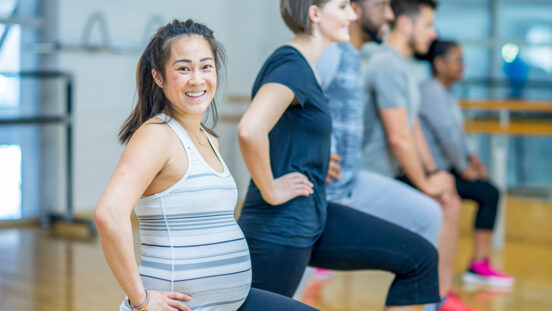
“Woo hoo” for trimester two!
Your baby is growing quickly now that you’re in the ‘sexy’ second trimester of your pregnancy – here’s what to expect during the next 13 weeks!
What to expect in your second trimester – week by week
Welcome to your pregnancy’s second trimester! Hopefully you’ve said goodbye to that intense fatigue and nausea of your first trimester and you’re ready to embrace your growing belly.
13 Weeks Pregnant
Now that you’re 13 weeks pregnant your baby has her own unique fingerprints, and is about the size of a large plum.
Your baby has peachy fuzz on her head from as early as week 13. She also has eyebrows and eyelashes, and is covered all over in lanugo – downy hair that helps to keep her warm. This is usually shed in the third trimester, but some newborns, especially premature babies, still have traces remaining.
14 Weeks Pregnant
If you had a window on the womb at 14 weeks, you’d see your unborn baby smiling and frowning.
Although your baby’s eyelids are still closed, she’s now aware of light and dark, and will see a warm red glow if you shine a torch against your bump.
READ NEXT: Find baby names from all over the world on these curated lists

15 Weeks Pregnant
You start to feel less tired and more energised, while your baby is busy flexing her muscles.
At 15 weeks, a skilled sonographer can usually tell whether you’re having a boy or girl.
16 Weeks Pregnant
Screening tests will take place at 16 weeks to check your baby’s development.
Your uterus and placenta are growing to accommodate your developing baby’s needs. Six weeks ago, your uterus weighed just 140g. Now, it tips the scales at 250g.
17 Weeks Pregnant
As your baby stretches and wriggles, you may feel that precious first kick at 17 weeks pregnant. You are showing more now and have a neat but obvious bump, which will be much more comfortable in stretchy or maternity clothes.
Although you may be tempted to become a couch potato for the next five months, you’ll really feel the benefit if you take care of your body – and the bonus is that being fit-ish should help you cope during labour.
18 Weeks Pregnant
While your bump is growing rapidly, your baby can hear what’s going on in the outside world at 18 weeks.
It’s typical that just when pregnancy seems to be getting easier, another niggle such as varicose veins appears. Simply veins that have stretched and dilated in order to carry the extra blood around your body, varicose veins are caused by an increase in the hormone progesterone, which makes the walls of the blood vessels soften and relax.
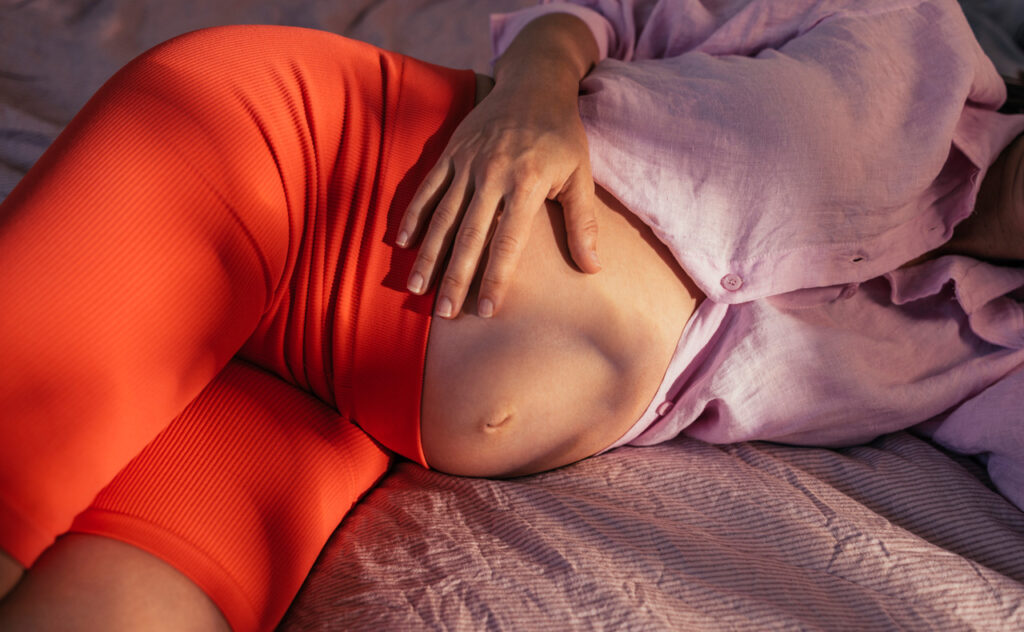
19 Weeks Pregnant
At 19 weeks your nipples will begin to look different and this change helps your newborn to latch on.
Don’t be surprised if you feel light-headed now and again. Hypertension (low blood pressure) is common during pregnancy from the second trimester onwards and can make you feel dizzy.
20 Weeks Pregnant
At your 20-week scan you’ll see a proper little person, fully formed and more or less in proportion. Her trunk and limbs will grow more slowly from this stage onwards, but she will start laying down fat at an amazing rate, in preparation for being born.
If your baby is a girl she already 3,000,000 eggs in her ovaries at just 20 weeks.
21 Weeks Pregnant
Your baby at 21 weeks is the weight and length of a banana.
The foods you eat flavour the amniotic fluid – and your baby can taste them. One study showed that bubs whose mums eat garlic breastfeed longer as the strong taste, which passes into breastmilk, is already familiar to them.
Experts can now successfully operate on unborn babies in the womb to repair problems such as holes in the heart, fluid around the lungs and hernias of the diaphragm. Previously, this was done by cutting into the womb (a partial caesarean), but now surgeons use microscopic keyhole surgery.
In the latter half of pregnancy, your uterus will grow by 1cm a week.
22 Weeks Pregnant
22 weeks is the time when you’re most likely to be able to relax and enjoy being pregnant – you should be over any morning sickness and still be completely mobile. Get to know your baby by spending some time every day exploring your bump and sending positive thoughts to your baby boy or girl.

23 Weeks Pregnant
Hormones can bring on crazy dreams and cause sleepless nights around 23 weeks.
Your baby’s nerves – the bundles of fibres that transmit vital messages between the brain or spinal cord and other parts of the body – are growing. A special cover is developing to protect the nerves of the precious spinal cord.
24 Weeks Pregnant
By week 24 your baby’s brain development is really taking off. Her brainwave patterns are similar to a newborn’s, and studies have suggested that she already has the beginnings of conscious thought and memory.
Week 24 is one of the major milestones of pregnancy. At this point, your baby is classed as ‘viable’ – in other words, she would stand a good chance (around 39%) of surviving if she was born now.
Feeling a regular tapping sensation? It’s probably just your baby having hiccups.
At 24 weeks, your baby has her own daily waking and sleeping patterns. Unfortunately they may not tie in with yours!
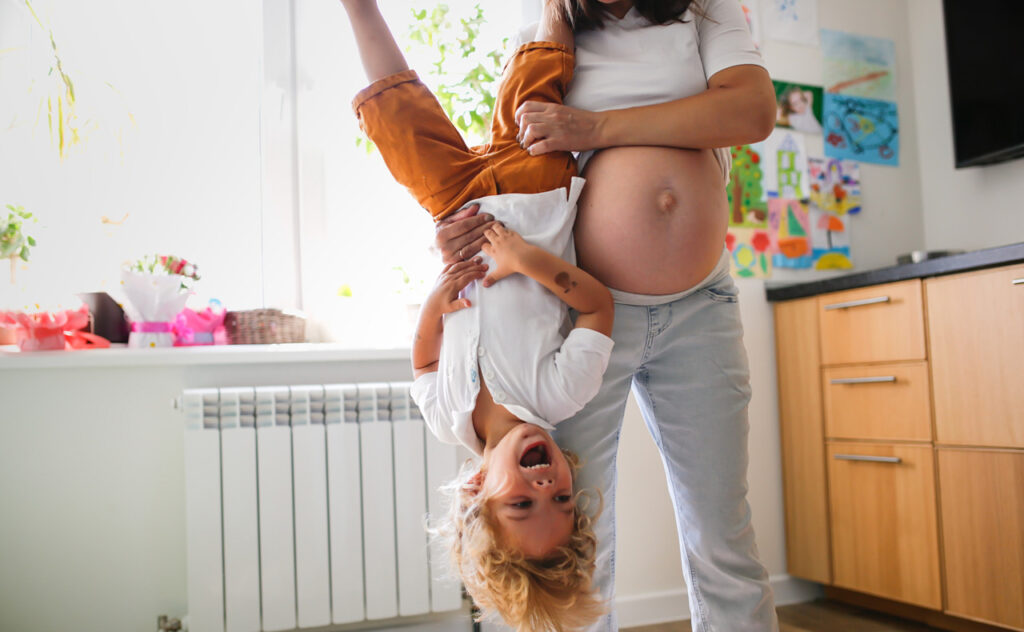
25 Weeks Pregnant
When your baby moves, you may experience pain under your ribs or in your lower abdomen. Her increased size, plus the growing uterus, all put pressure on your bowel, bladder and rectum. There’s not a lot you can do to relieve the pain – the best thing is to lie on your left side (this is the ideal position for your baby’s circulation) and rest.
By this 25 weeks, your breasts are ready for action: if your baby were to be born now, there would be an ample supply of milk on tap.
26 Weeks Pregnant
You’re steadily putting on weight at 26 weeks, at the rate of about 0.5kg a week. Ideally, you should put on the pounds gradually, whereas your baby gains most weight during the last three months of pregnancy. Interestingly, your weight gain bears little relation to the size of your baby.
27 Weeks Pregnant
At 27 weeks it’s not too late to do something about exercise. As an incentive, consider the fact that getting your circulation going increases your baby’s oxygen supply and reduces your risk of varicose veins and piles.
At every antenatal check-up, your blood pressure will be taken. This enables the midwife to check for signs of pre-eclampsia, a pregnancy illness that can be dangerous for you and your baby. The warning signs include severe headaches, flashing lights before your eyes, blood pressure shooting up and protein in your urine. Other symptoms are sudden weight gain, blurred vision and swollen face, hands and feet. If you develop any of these, see your GP or midwife immediately.
28 Weeks Pregnant
Suffering from leg cramps at 28 weeks. This painful pregnancy glitch is caused by the extra weight you’re carrying, and the pressure of the uterus on the nerves leading to your weary legs. A lack of calcium and too much phosphorus (found in soft drinks, snack foods and processed meat) also contributes to the problem.
There’s a lot of action this week in your baby’s brain, which increases in size and forms grooves and indentations called gyri and sulci on the surface.
Leave a Reply
You must be logged in to post a comment.
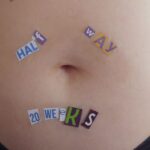


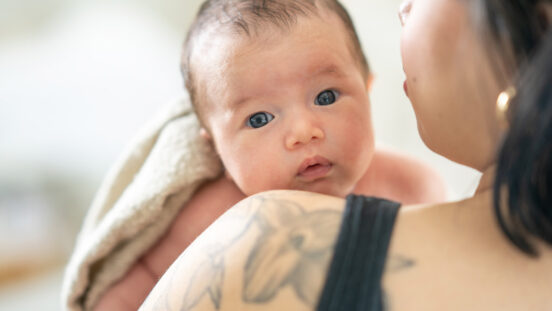

Currently 17 weeks. So exciting to know baby can hear me next week. So interesting to read the changes week to week
Currently 13 weeks with twin girls, so exciting to be able to see the different milestones each week. Even though I am not a first time mother it is crazy how quickly we forget these individual milestones. Seeing my girls a few days ago in a scan I could see how rapidly they have developed in such a short time.